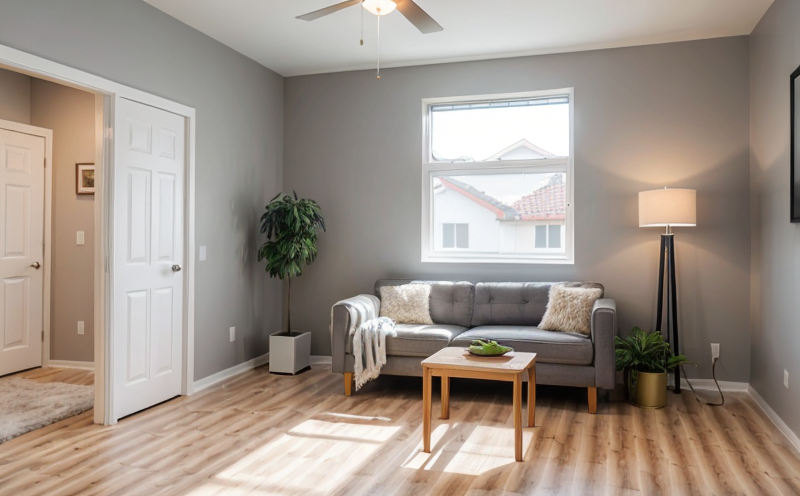Indoor Air Quality & Ventilation Testing
The quality of indoor air is a critical factor in ensuring occupant health and comfort within buildings. Poor ventilation can lead to various issues, including sick building syndrome (SBS), which manifests as symptoms such as headaches, dizziness, and respiratory irritation among occupants. Effective ventilation systems are essential for maintaining acceptable air quality levels that comply with international standards.
Indoor Air Quality (IAQ) testing focuses on identifying contaminants present in the indoor environment, including but not limited to volatile organic compounds (VOCs), particulate matter, carbon dioxide (CO2), formaldehyde, and radon. Ventilation testing evaluates whether the building's ventilation system is performing as designed, ensuring that sufficient fresh air is supplied to occupied spaces while minimizing the introduction of contaminants.
At Eurolab, our comprehensive IAQ & Ventilation Testing services adhere strictly to international standards such as ISO 16719:2013 and ASHRAE Standard 55-2017. These guidelines provide a framework for achieving optimal indoor comfort conditions by balancing thermal, humidity, and air quality factors.
Our team of experts employs advanced instrumentation to measure key parameters including particulate matter (PM), carbon dioxide (CO2), formaldehyde, ozone, nitrogen dioxide (NO2), and other pollutants. For ventilation testing, we assess airflow rates, pressure differentials, and duct sizing to ensure compliance with local regulations like the European Union's Energy Performance of Buildings Directive (EPBD).
Our approach ensures that businesses can meet regulatory requirements while also improving worker productivity by creating healthier indoor environments. By providing detailed reports highlighting areas where improvements are needed, we help clients implement targeted solutions to enhance IAQ and ventilation efficiency.
Scope and Methodology
The scope of our IAQ & Ventilation Testing services encompasses a wide range of parameters that impact air quality within commercial buildings. This includes the presence of biogenic volatile organic compounds (BVOCs), which are produced by plants, fungi, and bacteria, as well as synthetic VOCs released from building materials.
For indoor air testing, we utilize portable instruments capable of detecting trace levels of pollutants down to parts per billion (ppb). Our methodology involves taking multiple samples at different locations within the building over a specified period. This allows us to capture fluctuations in contaminant concentrations that might occur due to variations in occupancy or operational conditions.
In terms of ventilation testing, we employ state-of-the-art anemometers and pressure gauges to measure airflow rates and distribution patterns throughout the building. We also use smoke pens or tracer gases like SF6 to visualize airflow paths and identify any areas where air movement may be compromised.
Our testing protocols follow best practices outlined in relevant standards such as ISO 13788:2019 for determining indoor air quality, which specifies procedures for measuring particulate matter sizes. Additionally, we adhere closely to the guidelines provided by ASHRAE Standard 62.1-2019 on indoor airborne contaminants and CO2 levels.
By combining these methodologies with real-world measurements, our team provides clients with actionable insights into their building’s air quality and ventilation systems. This enables them to make informed decisions regarding necessary upgrades or adjustments to ensure compliance with health and safety regulations while enhancing overall occupant satisfaction.
Industry Applications
The need for reliable IAQ & Ventilation Testing extends across various sectors, including office buildings, schools, hospitals, and retail spaces. In offices, maintaining good air quality is crucial not only for employee health but also to support productivity levels. Schools face unique challenges due to high occupancy rates during school hours; proper ventilation helps prevent the spread of infectious diseases while ensuring adequate oxygen supply.
Hospitals require stringent control over their indoor environments given the presence of vulnerable patients who are more susceptible to infections. Ensuring that these facilities meet strict hygiene standards is paramount for patient care and recovery outcomes.
Retail establishments focus on creating inviting atmospheres that encourage customer visits and spending. Good air quality contributes significantly towards achieving this goal by fostering a pleasant shopping experience.
Our IAQ & Ventilation Testing services cater to the specific needs of each industry, offering tailored solutions designed to meet regulatory requirements while enhancing occupant well-being.
Eurolab Advantages
At Eurolab, we pride ourselves on delivering high-quality testing services that exceed industry expectations. Our team comprises experienced professionals with extensive knowledge of building and infrastructure testing practices. This expertise allows us to provide accurate assessments of indoor air quality and ventilation systems.
We utilize cutting-edge technology and instrumentation to ensure precise measurements of all relevant parameters. Our commitment to accuracy is reflected in our adherence to international standards, ensuring that the results we deliver are reliable and repeatable.
Our comprehensive reporting process provides clients with detailed insights into their building’s performance, highlighting areas where improvements can be made. This enables businesses to take proactive steps towards enhancing both air quality and ventilation efficiency.
In addition to our technical expertise, Eurolab offers exceptional customer service, ensuring that all queries are addressed promptly and professionally. Our goal is to build long-term relationships with clients based on trust and mutual respect.





